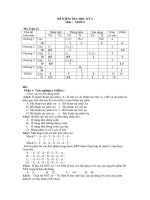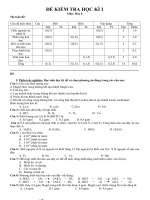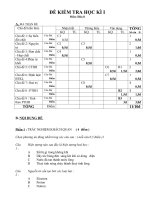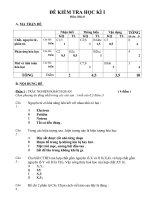Một số đề thi ielts speaking và đáp án band 9
Bạn đang xem bản rút gọn của tài liệu. Xem và tải ngay bản đầy đủ của tài liệu tại đây (483.08 KB, 9 trang )
46. Describe a change that you think would improve your local area.
You should say:
what local area
what change
how the change could be made
and explain how this change would be an improvement to your local area.
53. Describe a law about the environment that you would like to see.
You should say:
what the law would be about
how the law would work *
what effects this law would have (= what changes would result from this
law)
and explain why you would like to see this law in existence or why you think this law is
needed.
ANSWER:
-
I was born and raised in Hanoi and have been here for 27 years. I have watched the city
develop from a small town and grow into a modern metropolitan area in the new era.
With the skyrocketing population of recent years, the city’s environment has become
significantly polluted. As a result, I think environmental laws should be enacted
immediately to solve this problem.
-
First of all, Hanoi’s mayor should consider putting more trash bins out in the streets so
that people won’t throw rubbish anywhere anytime. In addition, the city police should
heavily fine those who are caught littering the streets. By doing so, not only could we
save a lot of money on cleaning costs but we could also improve the surrounding public
scenery.
Written by Ngoc Bach
Website: www.ngocbach.com
Page 1
-
Secondly, the city should run a campaign to educate people on how to classify and
separate garbage before throwing it out. This is necessary because unsorted garbage
contributes to the pollution of underground water and the earth.
-
In my opinion, although these above actions are minor, they would contribute to
diminishing the impacts of pollution in our local area if they were done on a collective
level.
Vocabulary
-
born and raised in: to describe that you were born in a certain place and that you grew
up there with your parents; “He was born and raised in New York but moved to
California when he was 35.”
-
skyrocketing: increasing, to describe when something goes up rapidly by a lot; “The
skyrocketing airline prices have hurt the tourist towns, as fewer people are traveling.”
-
significantly: in a sufficiently great or important way as to be worthy of attention, “Our
profit was significantly less this month than we had predicted.”
-
enacted: to put a law into place; “New laws have been enacted to keep people safe from
gun violence.”
-
rubbish: trash, garbage waste; “There is too much rubbish in this yard. Let’s clean it
up!”
-
heavily fine: to fine someone heavily means to charge them a lot of money because they
have violated a law or regulation; “The companies were heavily fined for polluting the
river.”
-
littering: throwing trash on the ground rather than putting it in the bin; “Littering is
against the law and you can be fined $1000.”
-
scenery: what you see in the natural environment; a beautiful scenery usually includes
beautiful nature scenes, but ugly scenery would have trash and pollution; “The scenery in
the Turkish countryside is beautiful.”
Written by Ngoc Bach
Website: www.ngocbach.com
Page 2
-
run a campaign: to organize and work on a program to reach a goal, such as a campaign
to educate people about pollution or teenage pregnancy or alcohol abuse; “He is in charge
of running the campaign to save dogs in our rural areas.”
-
to classify and separate: in the context of recycling, to classify means to figure out what
bin each item belongs in, such as glass, plastic, paper and then to put them into the
appropriate bins; “He is lazy and doesn’t like to classify and separate his garbage.”
-
to throw something out: to get rid of something; to put it in the trash; “My mother threw
out all my boyfriend’s old letters.”
-
unsorted: not separated; “The shirts were unsorted, so all the colors were mixed together
and it made it hard to find all the red ones.”
-
minor: small or insignificant; “We had a minor accident in our car today.”
-
diminishing: going down, lessening; “The pain has been diminishing since I took the
aspirin.”
-
impacts of: the effects of something on something else; “The impact of the storm has yet
to be fully understood.”
-
collective level: a collective is a group of people, so in this context if you are working at
a collective level, it means that people are working together to solve a problem; “This
problem will only be solved if we work at it on a collective level, not an individual
level.”
Written by Ngoc Bach
Website: www.ngocbach.com
Page 3
29. Describe an educational TV program that you have seen.
You should say:
what this program was (or, is) about
how often you have watched it
what types of people watch this program
and explain why you think it was (is) educational or explain what you liked
or disliked about this program.
49. Describe something that you would like to learn (how) to do. (Something that you
cannot do now)
You should say:
what you would like to learn to do
where you would learn it
how you would learn it
and explain why you would like to learn to do this.
56. Describe an art or craft activity that you did at school.
You should say:
what activity it was
how you did it *
who you did it with
and explain how you felt about this activity.
Written by Ngoc Bach
Website: www.ngocbach.com
Page 1
ANSWER:
-
Since I am very interested in handwork activities, I would like to learn how to make a
3D card. I love watching TV programs that teach you how to do crafts.
-
Nowadays, there are so many TV channels that focus on Do-It-Yourself activities but the
one that I find the most interesting and doable is “Art Attack” on Disney Channel. The
show airs for 30 minutes once a week.
-
For topic 29:
-
o
This show is made especially for young children and tweens, however, I think it is
also suitable for the parents and adults.
o
Each episode shows you how to make different arts and craft products, from a
handmade craft to a picture frame, or how to decorate your room, how to make a
flower vase from old newspaper, etc.
o
By watching these kinds of programs, children are encouraged to develop their
imagination. In addition, it also helps bring parents and kids closer to each other,
creating a strong bond among family members.
For topics 49 and 56:
o
The host of the show showed us step-by-step how to fold a paper to create a heart
shape and how we could glue the heart shape onto the blank card so that when we
opened it, the heart popped up.
o
It was very interesting to see the product after it was done. Nowadays, it is easy to
buy preprinted cards, but none of them are 3D. Being handmade makes the card
more unique and most importantly is that it was made by me. Imagine if someone
gave you a present and said that it was made by him or her, how special you
would feel!
Written by Ngoc Bach
Website: www.ngocbach.com
Page 2
Vocabulary
handwork activities: when you create something with your own hands; “My daughter loved to
do handwork activities when she was younger.”
crafts: projects that people like to do that involve creating something that is artsy, but is not
considered fine art. Examples are things that you make to decorate your home, quilting, sewing,
woodworking, etc. “I love to make crafts and give them to people as presents.”
Do-It-Yourself: also known as DIY, a popular term to talk about the things that people can do
themselves, like minor house repairs and maintenance, building things and working in their
yards; “My husband loves Do-It-Yourself house projects.”
doable: something is doable if it can be done, if you can do it; “Her son didn’t think his
homework was doable, but he was just complaining and being lazy.”
airs: to air means to run a program on TV or radio; “My favorite TV show airs every night at
5:00 p.m.”
tweens: describes kids between the ages of 10 and 12; they are in the tens, but they aren’t yet
considered teenagers because they haven’t hit the numbers that say teen, like thirteen; “I have a
class full of crazy tweens!”
suitable for: appropriate for, it’s okay for; “This show is not suitable for children and that is why
it is rated TV14.”
episode: an episode is one installment of a series of shows; a season may have 8 to 10 episodes
or more; “Did you see the new episode of Game of Thrones?”
decorate: to put things in a room to add color and artwork; “My bedroom is so boring; I need to
decorate it!”
these kinds of programs: use these kinds of to talk about something in the plural; use this kind
of to talk about something singular; “I like these kinds of bananas.” or “I like this kind of
banana.”
to create a strong bond: to make a strong connection with another person: “I created a strong
bond with the members of my soccer team over the last two years.”
Written by Ngoc Bach
Website: www.ngocbach.com
Page 3
to fold a paper: to move the different parts of a piece of paper over other parts; “Origami is the
art of folding paper into intricate shapes.”
imagine if: to think about a possibility, “Imagine if you were rich. What would you buy?”
Written by Ngoc Bach
Website: www.ngocbach.com
Page 4
25. Describe a situation (or time) when you received some useful advice.
You should say:
what the situation was
who gave you the advice
what the advice was
and explain how this advice was useful to you.
57. Describe an important conversation that you had with someone.
You should say:
when you had this conversation
who you had the conversation with
what the conversation was about
and explain how this conversation influenced you.
ANSWER:
-
It was 5 years ago when I was in my junior year of college, I was struggling to find out
what career would I follow in the future. As juniors, we had to choose courses related to
our business concentration such as marketing, finance, human resources or management.
At that moment, I was confused since I did not specifically like any of them.
-
As the deadline closely approached, I had to quickly make my decision. I decided to
talk with my father, a wise man, about my problem. Different from many other parents
who always make decisions for their children; my father guides me to the answer and lets
me choose what I want.
-
He asked me what I would like my life to be like when I graduated, then analyzed my
personality, discussed my strengths and weaknesses. He also showed me some career
paths I could follow if I chose certain options.
-
After an hour of talking to him, everything had become clearer and I finally made my
decision to follow a career in finance. Thanks to the conversation that day, I understood
more about myself. Five years have passed, I am now a financial analyst for an
entertainment company and I have never regretted my decision.
Written by Ngoc Bach
Website: www.ngocbach.com
Page 1
Vocabulary
career: your profession, the type of employment you will likely have for a long period of
your life or perhaps your entire life; “She was happy to have chosen a career that suited
her personality perfectly.”
related to: having to do with, having an association with; in this context the student
needs to take courses that are related to business; “She is tired of taking courses related to
her major; now she just wants to take classes for fun.”
deadline: a time when something is due, when it has to be done; “I am hoping that we
will finish this project by our deadline.”
closely approach: to get closer and closer to a certain point or destination in a short
amount of time; when something is closely approaching it means you are very near to
that time; “The baby’s due date is closely approaching and we still aren’t prepared.”
guides me: to guide is to help someone by showing them a way or by giving specific
information or assistance without actually doing the task for them; “The teacher guides us
in how to learn proper study techniques.”
analyzed my personality: to examine, assess or evaluate your personality from different
points of view; you can take a personality test like the Meyers-Briggs to help see your
patterns and propensities; “My mother is a psychologist and she loves to analyze people’s
personalities to see what makes them tick.”
regret: to feel sad, repentant, or disappointed over (something that has happened or been
done, especially a loss or missed opportunity). “He regretted not having attended college
sooner.”
Written by Ngoc Bach
Website: www.ngocbach.com
Page 2









